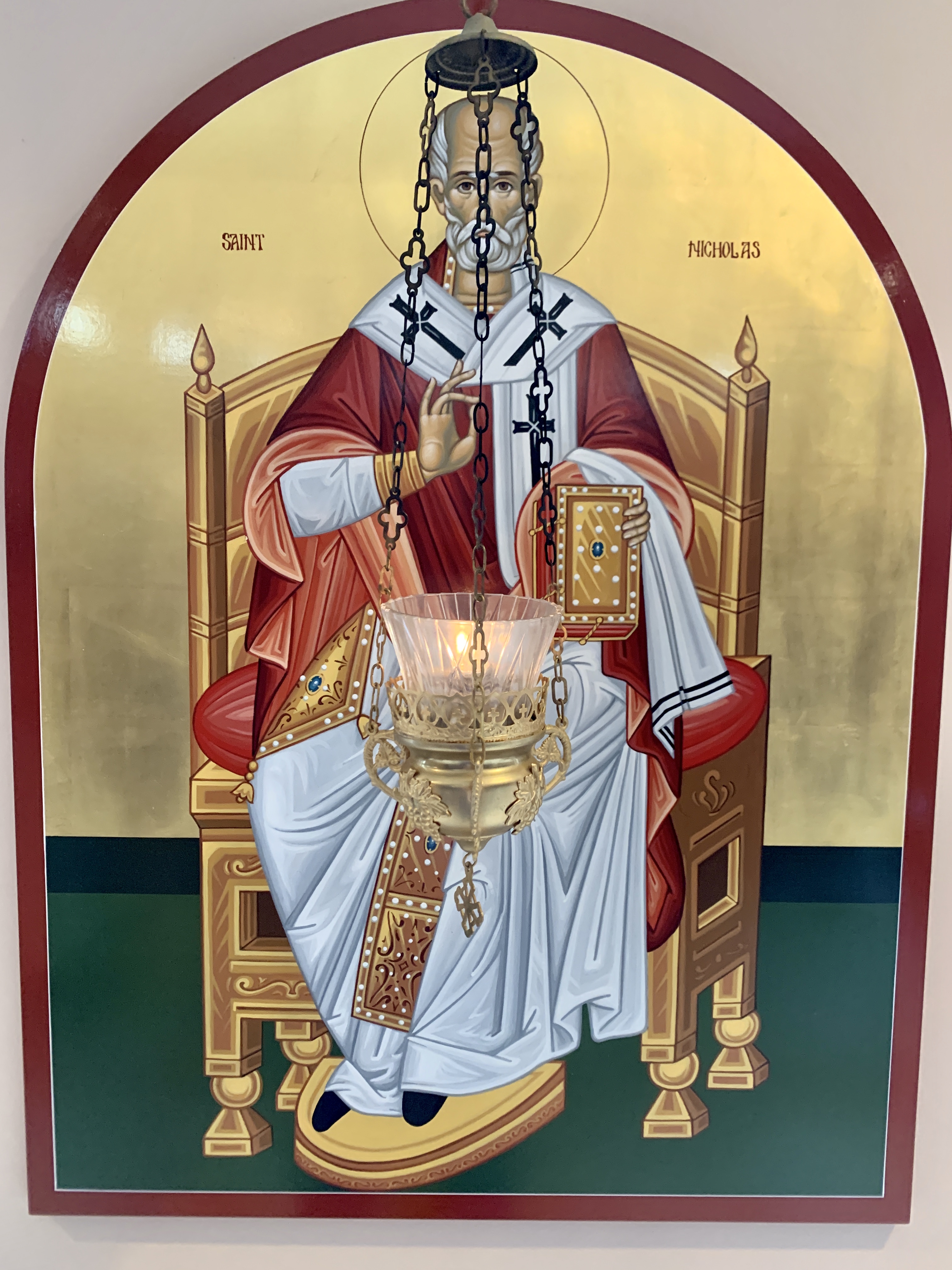 One can easily say that the greatest saint of the Byzantine Church is Nicholas the Wonderworker, Archbishop of Myra in Lycia. Yet the only thing we know of him for certain is his name, and that a holy man named Nicholas was the bishop in Myra in the fourth century. He has become essentially connected with the feast of Christmas. While the details of his life are certainly legendary, the first appearance is the Vita per Michaelem, in the ninth century, and then by Simeon Metaphrastes in the tenth century, yet we cannot help but suspect that there is a tradition of the goodness of his character that prompted such stories. He is the a golden example of all that is good in a true Christian, following the Lord in love for the poor, in joy of salvation, and in greatness of heart. Where, then, the stories written to fit his character. Certainly, the human race is hungry for such a saint, explaining his embrace by Greece and Russia as their patron saint. He gave a dowry to the poor girls, he saved sailors from storms, he obtained the liberation of those falsely accused. When his body was taken from Myra to Bari, the goodness of his life made him a favored saint throughout all the West.
One can easily say that the greatest saint of the Byzantine Church is Nicholas the Wonderworker, Archbishop of Myra in Lycia. Yet the only thing we know of him for certain is his name, and that a holy man named Nicholas was the bishop in Myra in the fourth century. He has become essentially connected with the feast of Christmas. While the details of his life are certainly legendary, the first appearance is the Vita per Michaelem, in the ninth century, and then by Simeon Metaphrastes in the tenth century, yet we cannot help but suspect that there is a tradition of the goodness of his character that prompted such stories. He is the a golden example of all that is good in a true Christian, following the Lord in love for the poor, in joy of salvation, and in greatness of heart. Where, then, the stories written to fit his character. Certainly, the human race is hungry for such a saint, explaining his embrace by Greece and Russia as their patron saint. He gave a dowry to the poor girls, he saved sailors from storms, he obtained the liberation of those falsely accused. When his body was taken from Myra to Bari, the goodness of his life made him a favored saint throughout all the West.
In the West, he has become secularized as “Santa Claus,” (possibly from early Dutch settlers, who would have known him “Sinterklass”). A poem by Thomas Nast in 1823, has been influential in the legend that he lives at the North Pole, and distributes toys to children on Christmas eve or early Christmas morning. This image, unfortunately, has sometimes been commercialized to sell products to be given as gifts.
As Christians, we surely recognize him as a saint, a bishop in Christ’s body, the Church. Perhaps from the visit of the Magi, giving gifts, and the legend of his life, of giving gold as a dowry have connected him with gift-giving. Gift-giving can be a sign of Christian love, as our Lord taught, as related by St. Paul: “Keep in mind the words of the Lord Jesus who himself said, ‘It is more blessed to give than to receive.’” (Acts 10:35) In giving gifts, we, together with the Magi, recognize the image of Christ in all people. In imitating the saints, we are brought closer to Christ. Is it not true, then, that on our Holy Father Nicholas and in the secularized Santa Claus, we see the same virtues: joy in life, generosity, love for all people, sincerity and truthfulness? Do we not also see in our Holy Father Nicholas and in the secular Santa Claus, the ability to perform wonders?
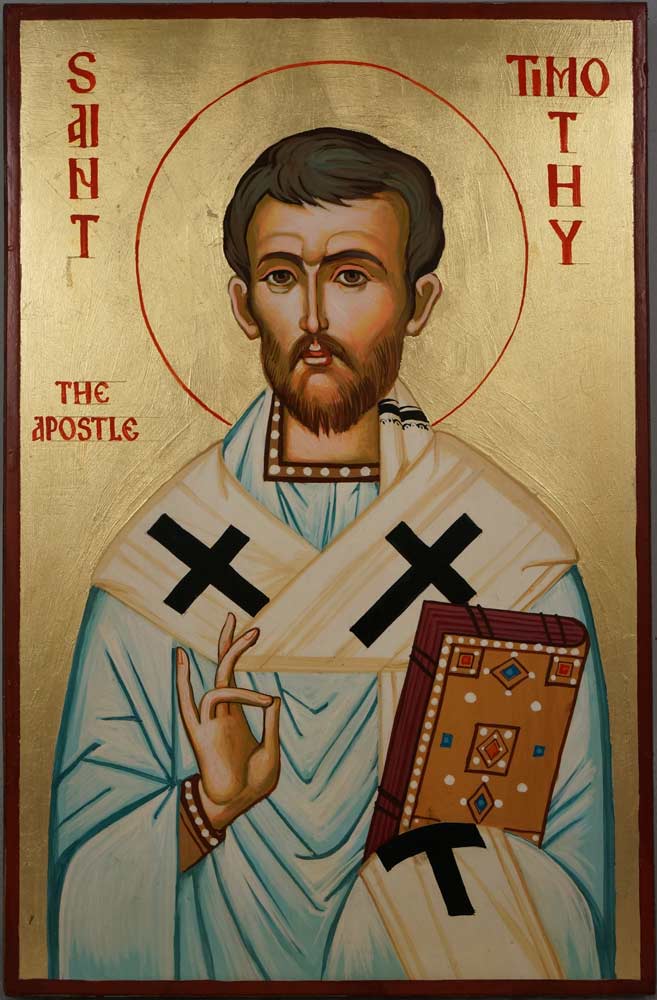 The holy apostle and martyr, Timothy, bishop of Ephesus, is honored by the Church today.
The holy apostle and martyr, Timothy, bishop of Ephesus, is honored by the Church today. St Maximus the Confessor is liturgically commemorated today.
St Maximus the Confessor is liturgically commemorated today.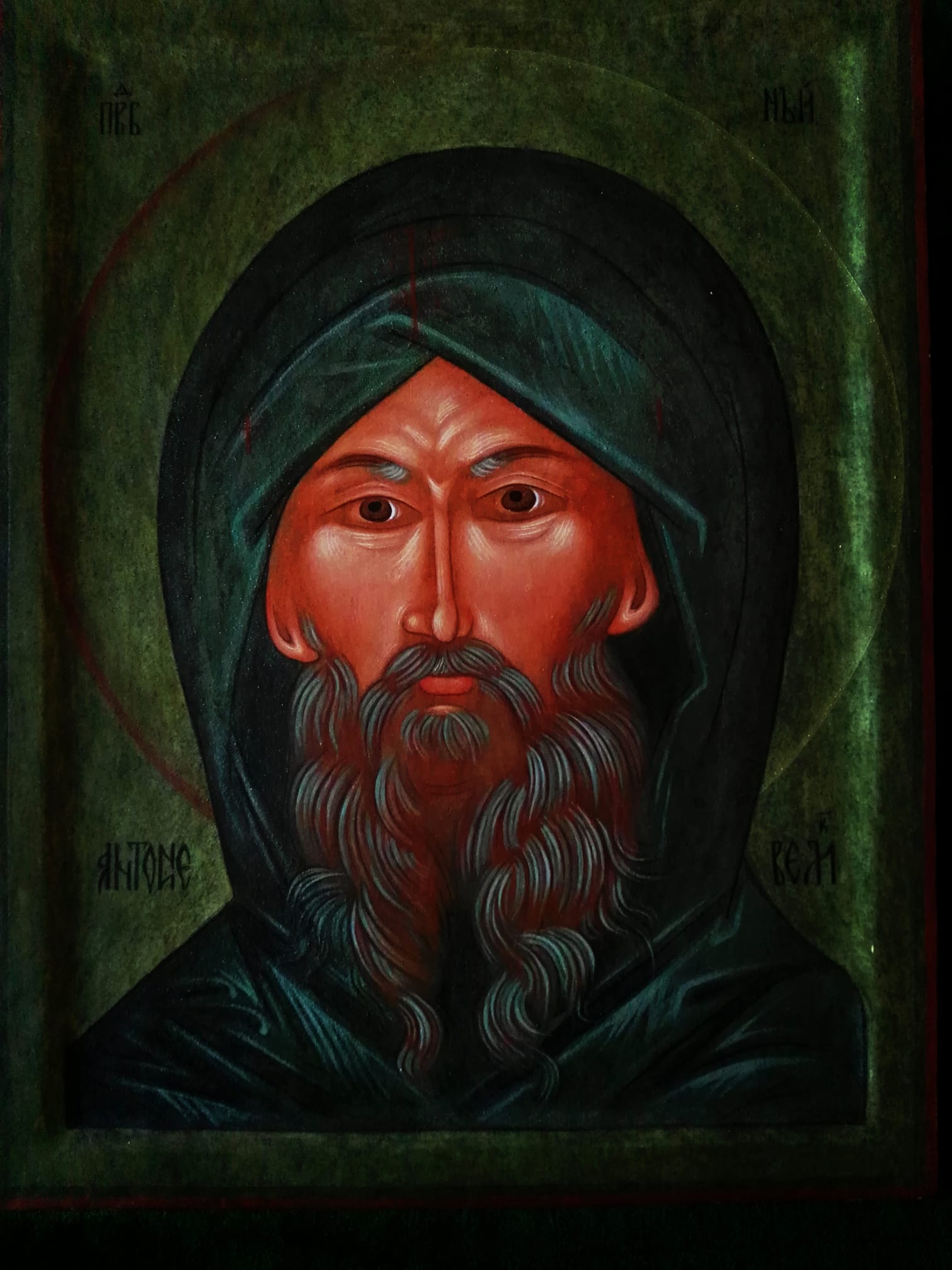 St. Anthony the Great, also called St. Anthony the Abbott (though he was a hermit) and St. Anthony of Egypt is commemorated on January 17. He is identified as the founder of desert monasticism, though the story of his life, particularly how he met St. Paul of Thebes, who preceded him into the desert, is a study of the search for Christian perfection. This story tells how he heard the gospel about the rich young man, to whom Jesus said, ““If you wish to be perfect, go, sell what you have and give to the poor, and you will have treasure in heaven” (Matthew 19:21). When Anthony heard this gospel, he immediately divested himself of all his possessions and went into the desert to seek Christian perfection. This is really the calling of all Christians, as Jesus commanded, “Be perfect, just as your heavenly Father is perfect. (Matthew 5:47)” For this we are baptized, that we might seek Godly perfection.
St. Anthony the Great, also called St. Anthony the Abbott (though he was a hermit) and St. Anthony of Egypt is commemorated on January 17. He is identified as the founder of desert monasticism, though the story of his life, particularly how he met St. Paul of Thebes, who preceded him into the desert, is a study of the search for Christian perfection. This story tells how he heard the gospel about the rich young man, to whom Jesus said, ““If you wish to be perfect, go, sell what you have and give to the poor, and you will have treasure in heaven” (Matthew 19:21). When Anthony heard this gospel, he immediately divested himself of all his possessions and went into the desert to seek Christian perfection. This is really the calling of all Christians, as Jesus commanded, “Be perfect, just as your heavenly Father is perfect. (Matthew 5:47)” For this we are baptized, that we might seek Godly perfection.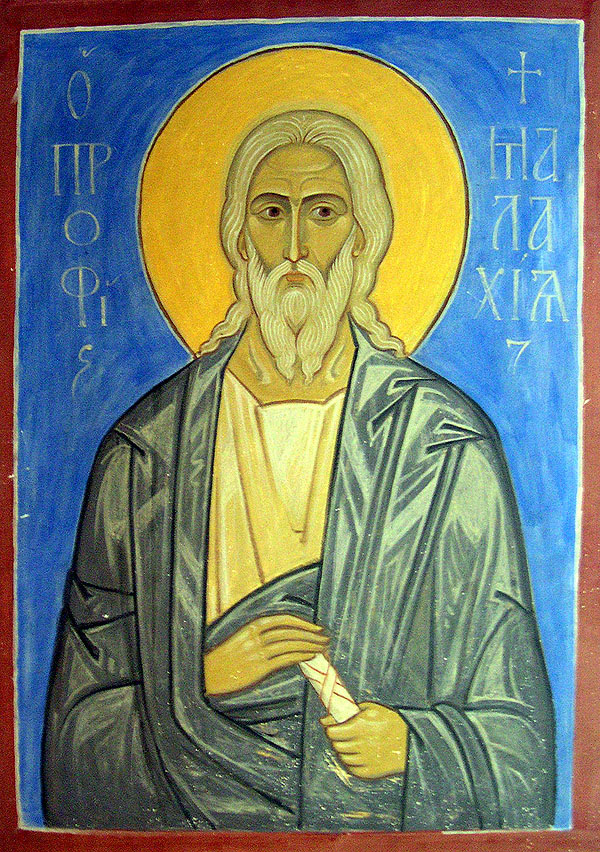 The holy prophet, Malachi. Second day of the prefestive period.
The holy prophet, Malachi. Second day of the prefestive period.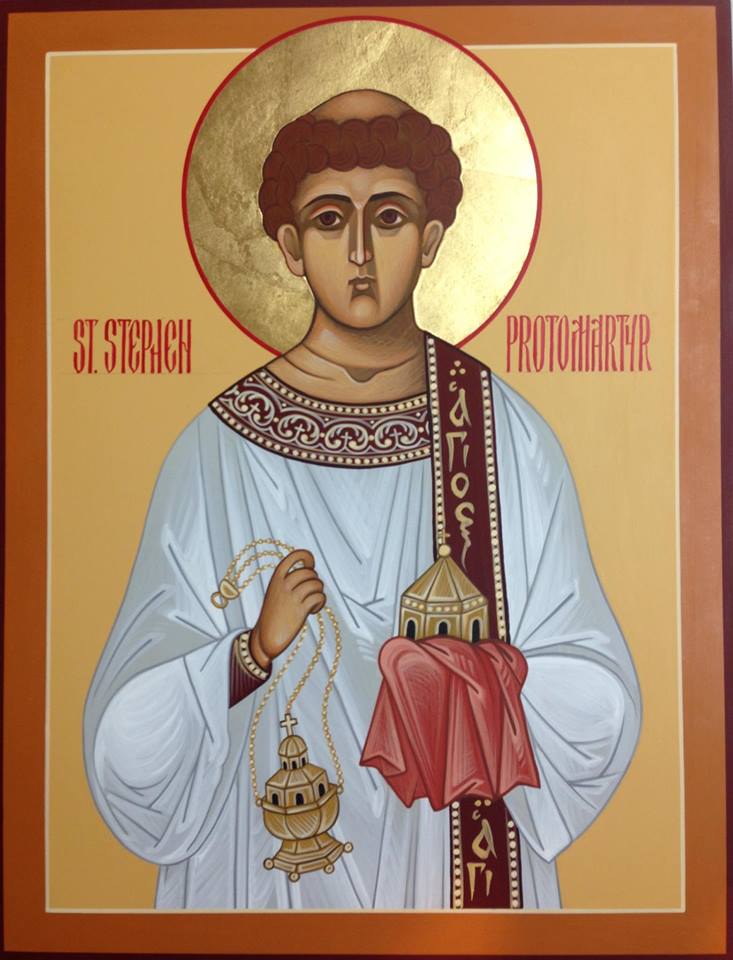 [In the Byzantine Church today is the feast day for St. Stephen while in the Latin Church December 26 is the day on which Stephen is liturgically commemorated.]
[In the Byzantine Church today is the feast day for St. Stephen while in the Latin Church December 26 is the day on which Stephen is liturgically commemorated.]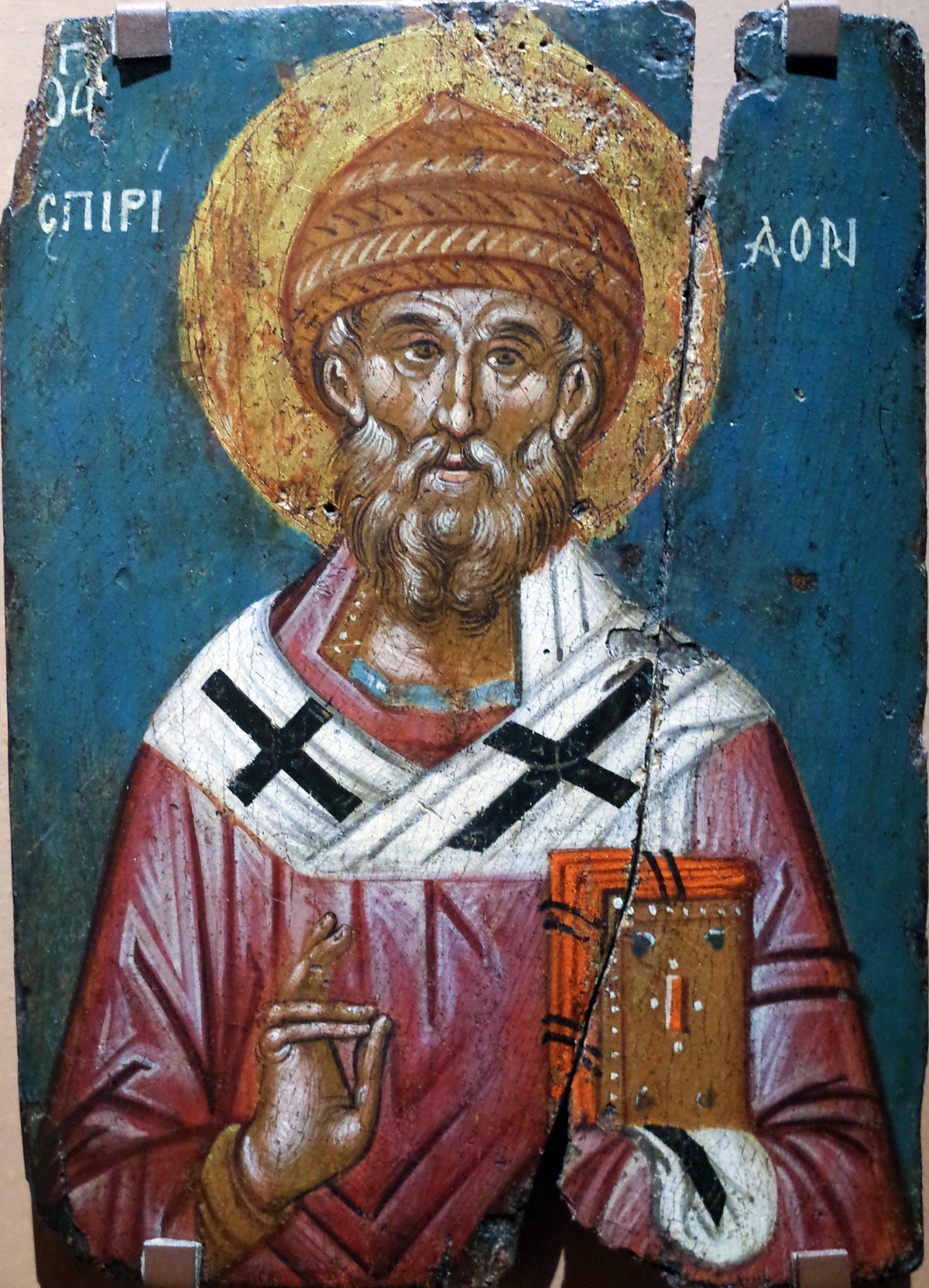 St. Spiridon is commemorated with special solemnity in the Greek Church. The Synaxarion tells us, that “he led the peaceful life of a simple shepherd. He was a plain, unpolished countryman and yet without equal when it came to love of neighbor, meekness, acts of kindness, almsgiving and the practice of virtues.” He was a man of hospitality, who would break his ascetic fast to feed a stranger in need. He was a man of simple and plain words, who put to shame the vain eloquence of a prelate “who wanted to show off by altering certain words of the Gospel too common for his taste.” He was a perfect example of a saint, for through him the love of Christ manifested itself, raising the dead, stopping droughts, looking into the hearts of sinners and forgiving them. Because of his Christ-like virtues, he was called from being a shepherd of sheep in the field, to being the bishop pastor of Christ’s rational sheep in Tremithus. In this way, he was the fulfillment of the shepherds who came to Christ at his birth.
St. Spiridon is commemorated with special solemnity in the Greek Church. The Synaxarion tells us, that “he led the peaceful life of a simple shepherd. He was a plain, unpolished countryman and yet without equal when it came to love of neighbor, meekness, acts of kindness, almsgiving and the practice of virtues.” He was a man of hospitality, who would break his ascetic fast to feed a stranger in need. He was a man of simple and plain words, who put to shame the vain eloquence of a prelate “who wanted to show off by altering certain words of the Gospel too common for his taste.” He was a perfect example of a saint, for through him the love of Christ manifested itself, raising the dead, stopping droughts, looking into the hearts of sinners and forgiving them. Because of his Christ-like virtues, he was called from being a shepherd of sheep in the field, to being the bishop pastor of Christ’s rational sheep in Tremithus. In this way, he was the fulfillment of the shepherds who came to Christ at his birth. One can easily say that the greatest saint of the Byzantine Church is Nicholas the Wonderworker, Archbishop of Myra in Lycia. Yet the only thing we know of him for certain is his name, and that a holy man named Nicholas was the bishop in Myra in the fourth century. He has become essentially connected with the feast of Christmas. While the details of his life are certainly legendary, the first appearance is the Vita per Michaelem, in the ninth century, and then by Simeon Metaphrastes in the tenth century, yet we cannot help but suspect that there is a tradition of the goodness of his character that prompted such stories. He is the a golden example of all that is good in a true Christian, following the Lord in love for the poor, in joy of salvation, and in greatness of heart. Where, then, the stories written to fit his character. Certainly, the human race is hungry for such a saint, explaining his embrace by Greece and Russia as their patron saint. He gave a dowry to the poor girls, he saved sailors from storms, he obtained the liberation of those falsely accused. When his body was taken from Myra to Bari, the goodness of his life made him a favored saint throughout all the West.
One can easily say that the greatest saint of the Byzantine Church is Nicholas the Wonderworker, Archbishop of Myra in Lycia. Yet the only thing we know of him for certain is his name, and that a holy man named Nicholas was the bishop in Myra in the fourth century. He has become essentially connected with the feast of Christmas. While the details of his life are certainly legendary, the first appearance is the Vita per Michaelem, in the ninth century, and then by Simeon Metaphrastes in the tenth century, yet we cannot help but suspect that there is a tradition of the goodness of his character that prompted such stories. He is the a golden example of all that is good in a true Christian, following the Lord in love for the poor, in joy of salvation, and in greatness of heart. Where, then, the stories written to fit his character. Certainly, the human race is hungry for such a saint, explaining his embrace by Greece and Russia as their patron saint. He gave a dowry to the poor girls, he saved sailors from storms, he obtained the liberation of those falsely accused. When his body was taken from Myra to Bari, the goodness of his life made him a favored saint throughout all the West.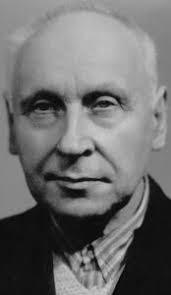 Ivan Sleziuk is one of the Ukrainian martyrs from the Soviet era persecution of the Church. He was born January 14, 1896, ordained priest in 1923 and ordained bishop in April 1945. Arrested in June 1945 and sentenced to 10 years in a labor camp and then after a release was arrested a second time and sent to a prison camp for another 5 years being released in 1968. Bishop Ivan died on December 2, 1973.
Ivan Sleziuk is one of the Ukrainian martyrs from the Soviet era persecution of the Church. He was born January 14, 1896, ordained priest in 1923 and ordained bishop in April 1945. Arrested in June 1945 and sentenced to 10 years in a labor camp and then after a release was arrested a second time and sent to a prison camp for another 5 years being released in 1968. Bishop Ivan died on December 2, 1973.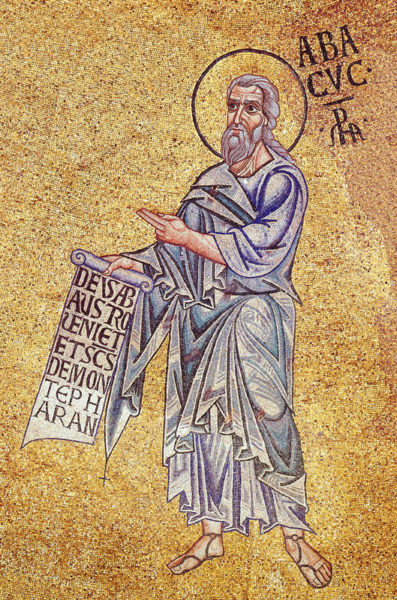 Habakkuk prophesied in Judah during the last half of the 7th century BC. He was one of the temple prophets — that is, his oracles were composed to be sung in temple worship; thus, they took the form of lamentations and canticles. Their liturgical character has persisted in out monastic office where the third chapter of his book is used as the fourth canticle of the traditional matins canon.
Habakkuk prophesied in Judah during the last half of the 7th century BC. He was one of the temple prophets — that is, his oracles were composed to be sung in temple worship; thus, they took the form of lamentations and canticles. Their liturgical character has persisted in out monastic office where the third chapter of his book is used as the fourth canticle of the traditional matins canon.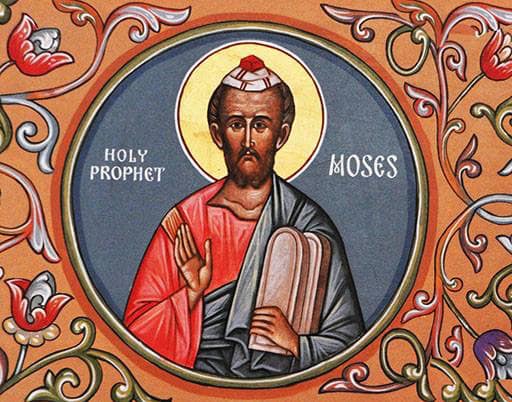 Today we celebrate St Moses the Prophet, according to tradition was born a Jew in Egypt at a time when the Jewish population was enslaved to the Egyptians. Moses was abandoned by his mother only to be adopted by the Egyptian royal family. Eventually Moses was called by God to be a leader to the Jewish people, interceding for them before Pharaoh, demanding their liberation, “Let my people go!” What followed is one of the earliest recorded campaigns of mass unarmed resistance in history. Trusting not in force of arms, but in the Lord, the Jewish people prayed, and God delivered them. They won their freedom, but it was not given easily. They marched out of Egypt in search of a promised land, but Pharaoh and his army followed, only to be once again routed by the work of God.
Today we celebrate St Moses the Prophet, according to tradition was born a Jew in Egypt at a time when the Jewish population was enslaved to the Egyptians. Moses was abandoned by his mother only to be adopted by the Egyptian royal family. Eventually Moses was called by God to be a leader to the Jewish people, interceding for them before Pharaoh, demanding their liberation, “Let my people go!” What followed is one of the earliest recorded campaigns of mass unarmed resistance in history. Trusting not in force of arms, but in the Lord, the Jewish people prayed, and God delivered them. They won their freedom, but it was not given easily. They marched out of Egypt in search of a promised land, but Pharaoh and his army followed, only to be once again routed by the work of God.